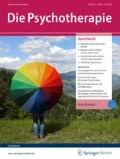Zusammenfassung
Die im wachsenden Maße wichtiger werdende Psychotherapie mit älteren Menschen kann auf neu entwickelte Modelle und Konzepte der allgemeinen und der klinischen Gerontopsychologie zurückgreifen.Im Beitrag werden u. a. das Modell der selektiven Optimierung mit Kompensation, das Kohorten-Kontext-Reife-Herausforderungs-Modell sowie das Alters- und störungsspezifische Rahmenmodell der Alterspsychotherapie vorgestellt. Das alters- und störungsspezifische Rahmenmodell integriert die Faktoren der subjektiv wahrgenommenen Entwicklungsverluste und -gewinne sowie Störungswissen, das auch spezifisch im Alter auftretende Störungen umfasst, für die es in den gegenwärtigen Klassifikationssystemen noch keine gut definierten Diagnosen gibt (z.B. kurz dauernde rezidivierende Depressionen, komplizierte Trauer). Als therapeutische Implikationen dieses Modells werden das Bedürfnis der Patienten nach selektiv optimierten Therapiezielen, altersspezifische Problemrepräsentationen, die Frage nach altersspezifischen Behandlungsansätzen sowie eine Reihe von Modifikationen der bestehenden therapeutischen Techniken dargestellt und diskutiert.Im Beitrag wird betont, dass zur Spezifik der Alterspsychotherapie das Wissen über häufige körperliche Erkrankungen und derenBehandlungsstandards sowie ggf. die enge Zusammenarbeit mit den anderen behandelnden Heilberuflern gehört.
Abstract
The psychotherapy of the elderly gets increasingly widespread and important.The paper outlines newly developed models of general and clinical gerontopsychology e.g.the model of selective optimization with compensation (SOC: Baltes u.Carstensen 1996), the contextual, cohortbased, maturity, specific challenge model (CCMSC: Knight 1996), and the age- and disorder-specific model of psychotherapy with the elderly (ADS-MP: Maercker 2002).The ADS-MP integrates aspects of the self-perceived development losses and gains of the elderly as well as disorderspecific knowledge, which also includes age-appropriate definitions and new conceptualisations of relevant disorders (e.g.Brief Recurrent Depression,Complicated Grief).Therapeutic implications of the model outlined and discussed are: the self-perceived need of the patients for selectively optimized treatment goals, age-specific problem representations, the question of a need for age-specific treatment approaches,and normative modifications of established therapeutic techniques.The paper highlights the need for psychotherapist working with the elderly to be well informed about frequent physical illnesses and their treatment standards and the close cooperation with other health care professionals involved with the particular patient.
Author information
Authors and Affiliations
Additional information
Prof.Dr.Dr.Andreas Maercker Klinische Psychologie II, Universität Zürich, Zürichbergstrasse 43, 8044 Zürich,Schweiz, E-Mail: maercker@klipsy.unizh.ch
Rights and permissions
About this article
Cite this article
Maercker, A. Alterspsychotherapie . Psychotherapeut 48, 132–149 (2003). https://doi.org/10.1007/s00278-003-0290-9
Issue Date:
DOI: https://doi.org/10.1007/s00278-003-0290-9

